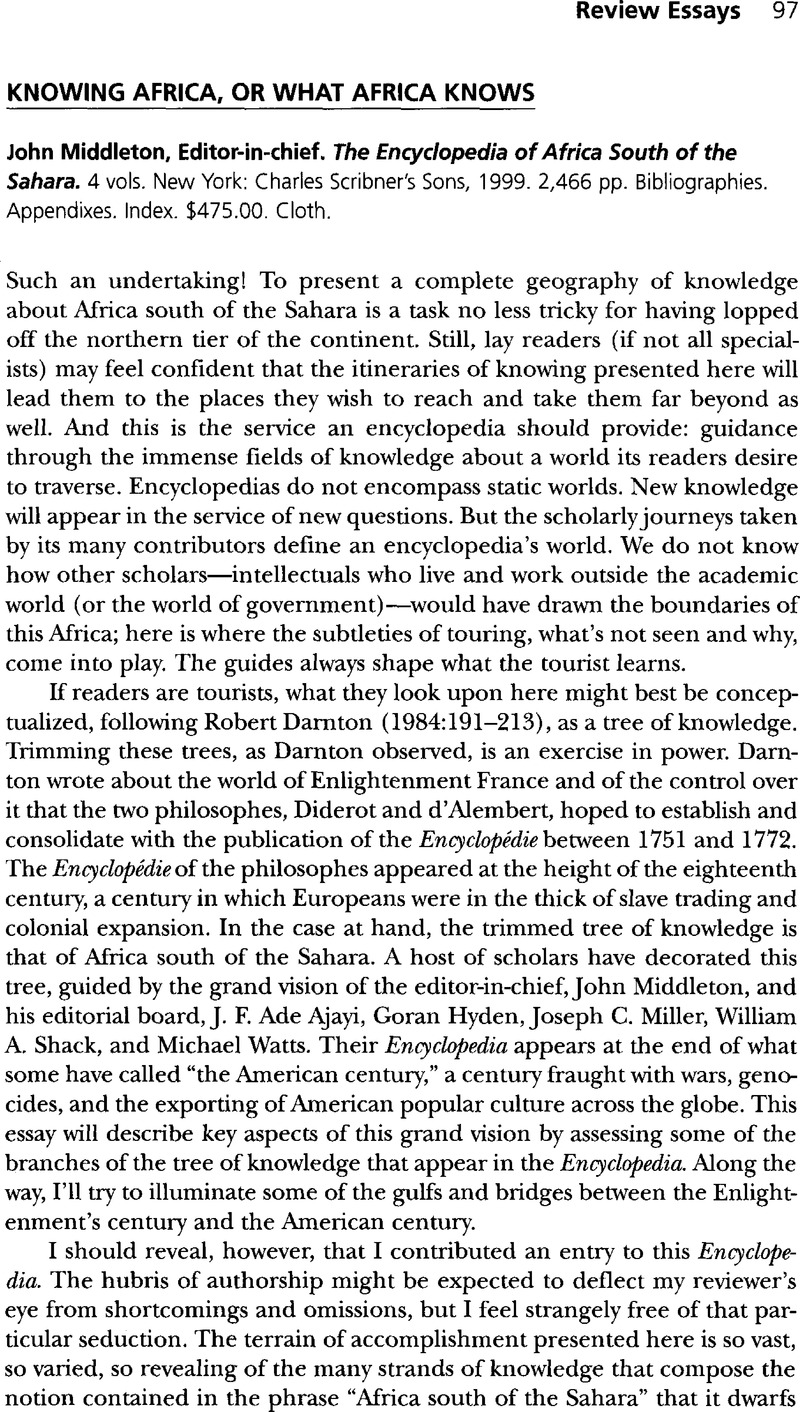No CrossRef data available.
Article contents
Knowing Africa, or What Africa Knows
Published online by Cambridge University Press: 23 May 2014
Abstract
An abstract is not available for this content so a preview has been provided. Please use the Get access link above for information on how to access this content.

- Type
- Review Essays
- Information
- Copyright
- Copyright © African Studies Association 2001
References
Amselle, Jean-Loup.
1998. Mestizo Logics: Anthropology of Identity in Africa and Elsewhere. Trans. Royal, Claudia. Stanford: Stanford University Press.Google Scholar
Anderson, Benedict. 1991. Imagined Communities: Reflections on the Origins and Spread of Nationalism. London: Verso.Google Scholar
Appiah, Kwame-Anthony, and Gates, Henry Louis Jr., eds. 1999. Africana: The Encyclopedia of the African and African American Experience. New York: Civitas Books.Google Scholar
Bastin, Yvonne, Coupez, Andre, and Mann, Michael. 1999. Continuity and Divergence in the Bantu Languages. Tervuren: Musée Royal de l’Afrique Centrale.Google Scholar
Bloch, Maurice. 1989. Ritual, History, and Power: Selected Papers in Anthropology. London: Cambridge University Press.Google Scholar
Burke, Timothy. 1996. Lifebuoy Men and Lux Women: Commodification, Consumption, and Cleanliness in Modern Zimbabwe. Durham, N.C.: Duke University Press.Google Scholar
Celenko, Theodore, ed. 1996. Egypt in Africa. Indianapolis: Indianapolis Museum of Art.Google Scholar
Chrétien., Jean-Pierre. 2000. L’Afrique des Grands Lacs: Deux mille ans d’histoire. Paris: Aubier.Google Scholar
Cohen, David William, and Odhiambo, E. S. Atieno. 1989. Siaya: A Historical Anthropology of an African Landscape. London: James Currey.Google Scholar
Cooper, Fredrick. 1994. “Conflict and Connection: Rethinking Colonial African History.” American Historical Review
99 (4): 1516–45.Google Scholar
Darnton, Robert. 1984. “Philosophers Trim the Tree of Knowledge: The Epistemological Strategy of the Encyclopédie
.” In Darnton, Robert, The Great Cat Massacre. New York: Basic Books.Google Scholar
Ehret, Christopher. 1999. “Subclassifying Bantu: The Evidence of Stem-Morpheme Innovation.” In Bantu Historical Linguistics: Theoretical and Empirical Perspectives, ed. Hombert, Jean-Marie and Hyman, Larry. Stanford: Center for the Study of Language and Information.Google Scholar
Enyclopedia Africana Project. 1995. The Encyclopedia Africana Dictionary of African Biography III. South Africa, Botswana, Lesotho, Swaziland. Algonac, Mich: Encyclopedia Africana Project, Reference Publications.Google Scholar
Fabian, Johannes, and Matulu, Tshibumba Kanda. 1996. Remembering the Present: Painting and Popular History in Zaire. Berkeley: University of California Press.Google Scholar
Feierman, Steven. 1990. Peasant Intellectuals: Anthropology and History in Tanzania. Madison: University of Wisconsin Press.Google Scholar
Feierman, Steven. “Colonizers, Scholars, and the Creation of Invisible Histories.” In Beyond the Cultural Turn: New Directions in the Study of Society and Culture, ed. Bonnell, Victoria E. and Hunt, Lynn. Berkeley: University of California Press.Google Scholar
Glassman, Jonathon. 1995. Feasts and Riot: Revelry, Rebellion, and Popular Consciousness on the Swahili Coast, 1856–1888. Portsmouth, N.H.: Heinemann Publishers.Google Scholar
Gondola, Didier Ch.
1999. “Dream and Drama: The Search for Elegance among Congolese Youth.” African Studies Review
43, (1): 23–48.Google Scholar
Hale, Thomas A.
1998. Griots and Griottes: Masters of Words and Music. Bloomington: Indiana University Press.Google Scholar
Hansen, Karen Tranberg. 1999. “Second-Hand Clothing Encounters in Zambia: Global Discourses, Western Commodities and Local Histories.” Africa
69 (3): 343–65.Google Scholar
Heine, Bernd, Hoff, H., and Vossen, Rainer. 1977. “Neuere Ergebnisse zur Territorialgeschichte der Bantu.” In Zur Sprachgeschichte und Ethnohistorie in Afrika, ed. Möhlig, Wilhelm, Rottland, Franz, and Heine, Bernd. Berlin: Dietrich Reimer Verlag.Google Scholar
Hunt, Nancy Rose. 1999. A Colonial Lexicon of Birth Ritual, Medicalization and Mobility in the Congo. Durham, N.H.: Duke University Press.Google Scholar
Hunwick, John O.
1999. Timbuktu and the Songhay Empire: Al-Sa’ di's Ta’rikh al-sudan down to 1613 and Other Contemporary Documents. Leiden: E.J. Brill.CrossRefGoogle Scholar
Isaacman, Allen, Cooper, Fred, and Roseberry, William. 1992. Confronting Historical Paradigms. Madison: University of Wisconsin Press.Google Scholar
Jeater, Diana. 1993. Marriage, Perversion, and Power: The Construction of Moral Discourse in Southern Rhodesia, 1894–1930. Oxford: Clarendon Press.CrossRefGoogle Scholar
Klieman, Kairn. 1997. Hunters and Farmers of Western Equatorial Rainforest: Economy and Society, 3000 B.C. to A.D. 1880. Ph.D. diss., UCLA.Google Scholar
MacGaffey, Wyatt. 1986. Religion and Society in Central Africa: The Bakongo of Lower Zaire. Chicago: University of Chicago Press.Google Scholar
Mbida, Christophe. 1996. L'émergence de communautés villageoises au Cameroun méridional. Étude archéologique des sites de Nkang et de Ndindan. Thèse de doctorat, Université Libre de Bruxelles.Google Scholar
Miller, Joseph. 1999. “History and Africa/Africa and History.” American Historical Review
104 (1): 1–32.Google Scholar
Murray, Steven O., and Roscoe, Will, eds. 1998. Boy-Wives and Female Husbands: Studies of African Homosexualities. New York: St. Martin's Press.Google Scholar
Newbury, David. 1991. Kings and Clans: Ijwi Island and the Kivu Rift, 1780–1840. Madison: University of Wisconsin Press.Google Scholar
Oyéwùmí, Oyèrónké. 1997. The Invention of Women: Making an African Sense of Western Gender Discourses. Minneapolis: University of Minnesota Press.Google Scholar
Pietz, William. 1987. “The Problem of the Fetish, 2: The Origin of the Fetish.” Res
13: 23–45.Google Scholar
Pietz, William. 1988. “The Problem of the Fetish, 3a: Bosnian's Guinea and the Enlightenment Theory of Fetishism.” Res
16: 105–23.Google Scholar
Ruhlen, Merritt. 1991. A Guide to the World's Languages. Volume 1: Classification. Stanford: Stanford University Press.Google Scholar
Sweet, James H.
2000. “Review of Steven O. Murray and Will Roscoe, eds. Boy-Wives and Female Husbands: Studies of African Homosexualities.” Journal of the History of Sexuality
9 (1–2): 205–8.Google Scholar
Tamari, Tal.
1997. Les Castes de l’Afrique Occidentale: Artisans et Musiciens Endogames. Nanterre: Société d’Ethnologie.Google Scholar
Vansina, Jan.
1985. Oral Tradition as History. Madison: University of Wisconsin Press.Google Scholar
White, Luise. 1994. “Between Gluckman and Foucault: Historicizing Rumour and Gossip.” Social Dynamics
20 (1): 75–92.Google Scholar


